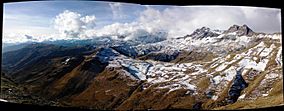Tunari National Park facts for kids
Quick facts for kids Tunari National Park |
|
|---|---|
|
IUCN Category II (National Park)
|
|

Tunari Mountain Range
|
|
| Location | Bolivia Cochabamba Department |
| Area | ca. 3,090 km² |
| Established | 1992 |
| Governing body | Servicio Nacional de Áreas Protegidas (SENAP) |
Tunari National Park is a special place in Bolivia, located in the Cochabamba Department. It's a national park, which means it's protected by the government to keep its nature safe. The park is named after the Tunari Mountain Range, which is a big part of it.
This park is very important for the environment and for the people living nearby. It helps protect many different kinds of plants and animals. It also plays a big role in providing water for the city of Cochabamba.
Contents
Tunari National Park: A Special Place
Tunari National Park was created in 1992. Its main goal is to protect the forests, mountains, and water sources in the area. It also helps keep the soil healthy and prevents erosion, which is when soil gets washed away.
The park covers a huge area, about 3,090 square kilometers. That's bigger than many cities! It stretches across different parts of the Cochabamba Department.
Where is Tunari Park?
Tunari National Park is located in the central part of Bolivia. It's mostly in the Cochabamba Department. The park includes parts of the Andes Mountains, which are very tall and beautiful. The city of Cochabamba is quite close to the park, and many people from the city rely on the park's natural resources.
The park's high mountains and valleys create many different types of environments. This means you can find a wide variety of plants and animals living there.
Why is Tunari Park Important?
Tunari National Park is important for several reasons:
- Protecting Nature: It keeps many unique plants and animals safe from harm. Some of these species might not be found anywhere else in the world.
- Water Source: The mountains in the park collect a lot of rain and snow. This water then flows down into rivers and streams, providing drinking water for the city of Cochabamba.
- Preventing Disasters: The forests and plants in the park help prevent landslides and floods. They hold the soil in place, especially on steep mountain slopes.
- Learning and Research: Scientists and students can visit the park to study its ecosystems. This helps us learn more about nature and how to protect it.
Animals and Plants of Tunari
The park's diverse landscape means it's home to many different living things. From high mountain peaks to lower valleys, each area has its own special plants and animals.
Amazing Animals
While specific animal lists can be long, national parks like Tunari often host a variety of wildlife. You might find:
- Birds: Many types of birds live here, including some that are unique to the Andes.
- Mammals: Smaller mammals and possibly some larger ones adapted to mountain life.
- Reptiles and Amphibians: These creatures thrive in the park's varied habitats.
Wonderful Plants
The plant life in Tunari National Park is also very rich. You can see different types of vegetation depending on the altitude:
- High Mountain Plants: Close to the peaks, you'll find tough grasses and small shrubs that can survive cold temperatures.
- Forests: In some areas, there are forests with native trees. These trees are important for the ecosystem and for local communities.
- Medicinal Plants: Many plants in the park have been used for centuries by local people for traditional medicine.
Protecting Tunari Park
Protecting Tunari National Park is a big job. The Servicio Nacional de Áreas Protegidas (SENAP) is the group in charge of looking after it. They work to make sure the park's rules are followed and that its nature stays safe.
One challenge for the park is the Misicuni Dam project. When the Misicuni Dam holds back water, some areas of the park might get flooded. This means careful planning is needed to protect the park's environment while also providing water for people. It's a balance between human needs and nature's needs.
Everyone can help protect places like Tunari National Park by learning about them and respecting nature.
See also
- Warawara Lake
 In Spanish: Parque nacional Tunari para niños
In Spanish: Parque nacional Tunari para niños
 | Leon Lynch |
 | Milton P. Webster |
 | Ferdinand Smith |

